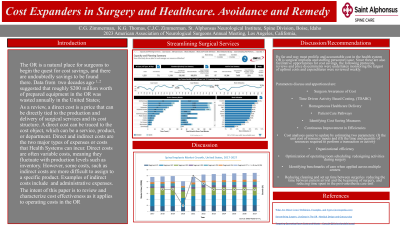Cost Expanders in Surgery and Healthcare. Avoidance and Remedy
Friday, April 21, 2023

Has Audio
.jpg)
Christian G. Zimmerman, MD, MBA, FAANS, FACS
Neurosurgeon
Trinity Health
Boise, Idaho, United States
ePoster Presenter(s)
Introduction: Health insurance is the largest component (26 percent) of nonwage compensation and health care is one of the largest categories of consumer spending approximately8.1 percent of consumer expenditures. Growth in healthcare costs represents a range of factors, from new health-care treatments and services to better coverage, higher utilization, and rising prices. Some of these changes are desirable, some not.
Methods: Spending by private and public payers have both increased. The health-care system that largely consists of private providers and private insurance, has become a larger part of the economy, a higher share of health-care funding has been provided by government. We describe the factors of healthcare cost expansion and how they are shaping health care.
Results: We highlight the surge in health-care expenditures and their current high level. We note the wide variation of expenditures across individuals—something that necessitates insurance. We also focus on 'surprise billing,' the latest method of cost expansion by systems and providers alike.
Conclusion : Removing excess costs from the health-care system is both an economic imperative and a complement to policy efforts to improve health-care access and outcomes
Methods: Spending by private and public payers have both increased. The health-care system that largely consists of private providers and private insurance, has become a larger part of the economy, a higher share of health-care funding has been provided by government. We describe the factors of healthcare cost expansion and how they are shaping health care.
Results: We highlight the surge in health-care expenditures and their current high level. We note the wide variation of expenditures across individuals—something that necessitates insurance. We also focus on 'surprise billing,' the latest method of cost expansion by systems and providers alike.
Conclusion : Removing excess costs from the health-care system is both an economic imperative and a complement to policy efforts to improve health-care access and outcomes
